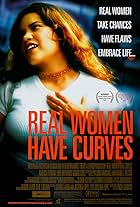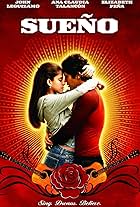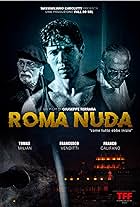IMDb RATING
6.7/10
1.6K
YOUR RATING
A teacher becomes a mentor to Chicano high-school students protesting injustices in schools in 1968.A teacher becomes a mentor to Chicano high-school students protesting injustices in schools in 1968.A teacher becomes a mentor to Chicano high-school students protesting injustices in schools in 1968.
- Awards
- 8 wins & 10 nominations total
Alexa PenaVega
- Paula Crisostomo
- (as Alexa Vega)
Holmes Osborne
- Principal Ingles
- (as Holmes Osbourne)
Veronica Diaz Carranza
- Yoli Rios
- (as Veronica A. Diaz)
Marisol Romo
- Mita Cuaron
- (as Marisol Crisostomo-Romo)
Featured reviews
First of all, this is the first movie ever about the Chicano civil rights movement. And as many Latinos know, the Chicano civil rights movement created some better opportunity for our people.
The cast is almost entirely Chicano, which is amazing within itself, seeing that Latinos only make up 2% of Hollywood. It gives us a chance to play Characters, and not only the "Brown person".
A piece of history is being told, which has been totally written out of History by the mainstream media & educational institutions. All of the police beating scenes in this movie were re-creations of archived material from TV Stations, which were not allowed to broadcast in 1968.
The protagonist is a young woman who is half Filipina & Mexicana. This is great because revolutionary leaders are usually only seen as tough men. This also shows that oppression crosses all color lines, the issues come down to a class struggle, and this can be a catapult for different ethnicities working together on common issues.
I feel that we should embrace this movie, and create others also, with stories of our peoples struggle. There are several movies about the Jewish struggle, the African American movement for equal rights, women's rights, but this is so far, the only one speaking of the Chicano civil rights struggle.
The cast is almost entirely Chicano, which is amazing within itself, seeing that Latinos only make up 2% of Hollywood. It gives us a chance to play Characters, and not only the "Brown person".
A piece of history is being told, which has been totally written out of History by the mainstream media & educational institutions. All of the police beating scenes in this movie were re-creations of archived material from TV Stations, which were not allowed to broadcast in 1968.
The protagonist is a young woman who is half Filipina & Mexicana. This is great because revolutionary leaders are usually only seen as tough men. This also shows that oppression crosses all color lines, the issues come down to a class struggle, and this can be a catapult for different ethnicities working together on common issues.
I feel that we should embrace this movie, and create others also, with stories of our peoples struggle. There are several movies about the Jewish struggle, the African American movement for equal rights, women's rights, but this is so far, the only one speaking of the Chicano civil rights struggle.
Not growing up in the 60's (actually being born in 77), I don't have too much of an idea of what happened during these times with the exception of what my parents had told me while growing up. It was interesting to see a lot of it played out on screen.
Growing up in L.A. in the time that I did though and watching this movie showed me that not much has changed. I went to schools in three distinctive area. I attended in private schools, Inner city schools and in nice suburban areas and can tell you there is a significant difference in teaching styles. It is too bad that such a movement did not change that. May I add that I do not believe it is the teachers fault, it has to do with the funds that each area receives.
I feel that some of the people commenting on film have seen it or are commenting on it with a certain "bad vibe" mindset to begin with. I have seen people comment saying it was only Mexican-American or Chicano's leaving the schools, wanting to ditch or etc. That no one else was part of the Walkouts. Which leads me to the following questions; 1. If you were not part of the walkouts (I am assuming this because you say only Mexican-Americans were part of the walkouts) how do you know exactly who attended? 2. How can you tell who is Central American, South American, Mexican? It has been said that the media was not allowed to air certain footage with that being the case, please don't tell me that you got this information through the media.
People on this forum have also stated that the walkouts were a waste of time that because things are the same there was no just cause for them. Would you say the same of the Anti-War Protests of then and now? I mean, we still have wars.
Though in your mind, maybe these walkouts meant nothing or the causes have not changed anything now, they changed thing's then. For those people and to those people it mattered. You may say, "No one that they interviewed became a Lawyer or Doctor, etc. so what were they fighting for?", They were fighting for the education to allow them to advance in whatever path they chose.
I see people put this film down because it is not the way they recalled it and that no one should glamorize this because it was a chance for gang youth to ditch school. Again, if you weren't there how do you know who attended? Every protest and every following has a few bad apples that ruin it for all, it's human nature. Does human nature make their actions acceptable? No, but it is there. (Let's remember the people who bombed SUV dealerships, as I recall they consider themselves Environmentalist and I have seen them only point out White Americans in these cases).
Let us see this film as an educational film. Something to show us a part of history through someone else's eyes. Not butcher the film because of it's message, lighting, acting, writing, etc.
At one point in my life I had someone tell me that she felt sorry for my generation. That I lived in a time where my generation had as many things to deal with, in different forms, as her generation of the 60's and we did not protest. We would just sit around and wait for the problems to resolve themselves. (BTW she was white not Hispanic or of Hispanic descent) If you disagree with the film, that is your opinion and accepted as we are in (technically) the land of the free. You have free speech, use it. Who know's you may direct, write or star in the next best film representing your ideas and how you see the world at hand.
Final words, Watch Rashômon by Akira Kurosawa. It is a film used in Law Schools (the ones where I have attended) to show different points of view.
Remember there are always 4 stories to tell, Your Story, Their Story, The Witness Story and the Truth.
Growing up in L.A. in the time that I did though and watching this movie showed me that not much has changed. I went to schools in three distinctive area. I attended in private schools, Inner city schools and in nice suburban areas and can tell you there is a significant difference in teaching styles. It is too bad that such a movement did not change that. May I add that I do not believe it is the teachers fault, it has to do with the funds that each area receives.
I feel that some of the people commenting on film have seen it or are commenting on it with a certain "bad vibe" mindset to begin with. I have seen people comment saying it was only Mexican-American or Chicano's leaving the schools, wanting to ditch or etc. That no one else was part of the Walkouts. Which leads me to the following questions; 1. If you were not part of the walkouts (I am assuming this because you say only Mexican-Americans were part of the walkouts) how do you know exactly who attended? 2. How can you tell who is Central American, South American, Mexican? It has been said that the media was not allowed to air certain footage with that being the case, please don't tell me that you got this information through the media.
People on this forum have also stated that the walkouts were a waste of time that because things are the same there was no just cause for them. Would you say the same of the Anti-War Protests of then and now? I mean, we still have wars.
Though in your mind, maybe these walkouts meant nothing or the causes have not changed anything now, they changed thing's then. For those people and to those people it mattered. You may say, "No one that they interviewed became a Lawyer or Doctor, etc. so what were they fighting for?", They were fighting for the education to allow them to advance in whatever path they chose.
I see people put this film down because it is not the way they recalled it and that no one should glamorize this because it was a chance for gang youth to ditch school. Again, if you weren't there how do you know who attended? Every protest and every following has a few bad apples that ruin it for all, it's human nature. Does human nature make their actions acceptable? No, but it is there. (Let's remember the people who bombed SUV dealerships, as I recall they consider themselves Environmentalist and I have seen them only point out White Americans in these cases).
Let us see this film as an educational film. Something to show us a part of history through someone else's eyes. Not butcher the film because of it's message, lighting, acting, writing, etc.
At one point in my life I had someone tell me that she felt sorry for my generation. That I lived in a time where my generation had as many things to deal with, in different forms, as her generation of the 60's and we did not protest. We would just sit around and wait for the problems to resolve themselves. (BTW she was white not Hispanic or of Hispanic descent) If you disagree with the film, that is your opinion and accepted as we are in (technically) the land of the free. You have free speech, use it. Who know's you may direct, write or star in the next best film representing your ideas and how you see the world at hand.
Final words, Watch Rashômon by Akira Kurosawa. It is a film used in Law Schools (the ones where I have attended) to show different points of view.
Remember there are always 4 stories to tell, Your Story, Their Story, The Witness Story and the Truth.
I am 41 years old. I went to Griffith Jr. high and graduated from Montebello HS in 1982. (I barely graduated, got pregnant and married by age 19, typical story of a non-informed, non-motivated Mexican/American youth). My best friend went to Roosevelt HS and my boyfriend (at the time) went to Garfield HS. I am amazed and outraged that I had never heard of this "walk out" until just last night (3/22/06). I just happened to be scrolling through the movies to watch on HBO. I read the description of the movie and was intrigued. Why was this not in the history books? or even spoken to us as students in the community from our teachers, counselors, mentors, etc? It's just another kick in the #@%! This movie should be shown to all students in Jr. High and High school, especially in heavy Chicano communities. As a matter of fact, I am going to sit through it again with my two nieces (8 & 11 years old) and my 21 year old daughter (she graduated "magna cum laude" from La Salle HS, is now graduating next June from Cal Poly Pomona and will be entering Pepperdine University to accomplish her Masters Degree
how proud is this (divorced) mother! ..a "former" non-informed, non-motivated Mexican/American youth).
Yes, the movie itself wasn't the best, the acting was okay, the SUV in the background ( 1968) ..But lets look at the bigger picture. The story. The true story and it's meaning. It is such an important part of our history, so profound and full of inspiration.
Yes, the movie itself wasn't the best, the acting was okay, the SUV in the background ( 1968) ..But lets look at the bigger picture. The story. The true story and it's meaning. It is such an important part of our history, so profound and full of inspiration.
I was totally unaware of all that had happened with the Chicano movement. I was shocked to find out that Universities kept Chicanos out. Sometimes you take things for granted and think that is the way it has always been. As a Chicana, it made me realize all the sacrifices that have been made on my behalf. For this reason, I think as Chicanos we should strive to be successful and go to college. We should also instill in our children a sense of pride in being Chicano. I think that even today there are Hispanics that are ashamed of their culture and raise their kids not knowing how to speak Spanish when their last name is Martinez. The Hispanic population in the U.S. has grown dramatically and for this reason more than ever we need to have a sense of identity about who we are and be proud of it. I really liked this movie and encourage Latino families to sit down and watch it with their kids.
...meaning her father is Filipino and her mother is a Chicana? Or is she full-blooded Filipina, because the real Paula looked totally Malay to me?
BTW...There are Filipinos of Mexican(Indios and Meztisos)ancestry so having a Latino looking Filipino father is not so far off...how you say? Nueva Espana(Mexico) governed the Philippines for over 300 years with most of the colonizers from Mexico. Philippines culture has a distinctly Mexican flavor...The Virgen De Guadalupe is the Philippine's Patron Saint... Filipino language is peppered with Nahuatl words...customs and traditions are Mexican/Spanish in origin (Dia De Los Muertos, e.g.)
I give the actor credit with the somewhat Filipino accent ("I'm prum the Peeleepeens")
I enjoyed the movie, even though it was kinda fluffy. It should have been more gritty and blood-spattered(come on, they were hit with batons on the head!)
Over all, it was a stirring movie that made me want to go out protest something!
BTW...There are Filipinos of Mexican(Indios and Meztisos)ancestry so having a Latino looking Filipino father is not so far off...how you say? Nueva Espana(Mexico) governed the Philippines for over 300 years with most of the colonizers from Mexico. Philippines culture has a distinctly Mexican flavor...The Virgen De Guadalupe is the Philippine's Patron Saint... Filipino language is peppered with Nahuatl words...customs and traditions are Mexican/Spanish in origin (Dia De Los Muertos, e.g.)
I give the actor credit with the somewhat Filipino accent ("I'm prum the Peeleepeens")
I enjoyed the movie, even though it was kinda fluffy. It should have been more gritty and blood-spattered(come on, they were hit with batons on the head!)
Over all, it was a stirring movie that made me want to go out protest something!
Storyline
Did you know
- TriviaProducer Moctesuma Esparza was one of the persons arrested in the real-life 1968 walkout.
- GoofsWhen Robert drops off Paula at her home, Al is wearing a yellow shirt. In the next scene, inside the house, his shirt is blue.
- Quotes
Moctesuma Esparza: Boycott the schools?
Paula Crisostomo: Yes!
Harry Gamboa: That's not a good idea!
Moctesuma Esparza: Oh it isn't?
Harry Gamboa: No! You wanna know why? Because they don't give a *shit* if these kids go to school or not!
Moctesuma Esparza: Actually, they do! ADA - Average Daily Attendance!
Paula Crisostomo: They don't get paid if we don't go to school!
- ConnectionsReferenced in Strictly Background (2007)
Details
- Release date
- Country of origin
- Official site
- Language
- Also known as
- Studentski štrajk
- Filming locations
- Production companies
- See more company credits at IMDbPro
Box office
- Budget
- $9,500,000 (estimated)
- Runtime1 hour 50 minutes
- Color
- Sound mix
- Aspect ratio
- 1.85 : 1
Contribute to this page
Suggest an edit or add missing content


































